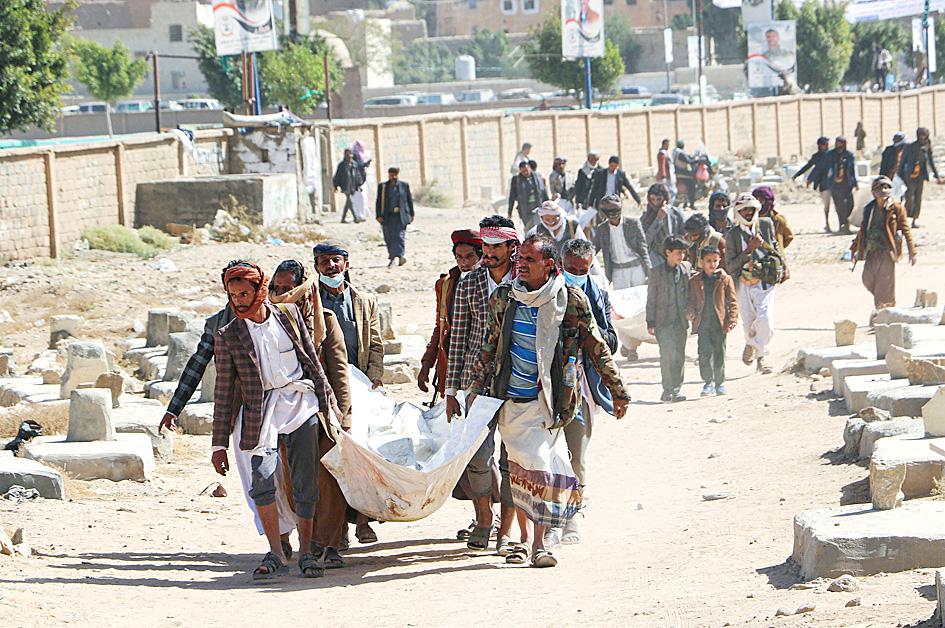More than 50 million people are affected by conflict in urban areas from Afghanistan to Libya, Syria, Yemen and beyond, where they face a much higher risk of being killed or injured, UN Secretary-General Antonio Guterres said on Tuesday.
In some cases, civilians might be mistaken for combatants and attacked, while in others, fighters do not try to minimize harm and use explosive weapons in crowded areas that lead to devastating suffering for ordinary people who face life-long disabilities and grave psychological trauma, Guterres told a UN Security Council meeting on the protection of civilians in urban settings during wars.
During last year’s fighting in Gaza between Israel and Hamas militants, dozens of schools and healthcare facilities were damaged, and nearly 800,000 people were left without piped water, he said.

Photo: Reuters
In Afghanistan, an explosive attack outside a high school in the capital, Kabul, in May last year killed 90 students, mainly girls, and injured an additional 240 people, he said.
The risk of harm to civilians “rises when combatants move among them, and put military facilities and equipment near civilian infrastructure,” he said.
However, conflict in urban areas “goes far beyond its immediate impact on civilians,” he said.
Urban warfare also put civilians at risk of sieges and blockades that have led to starvation, he said.
It also forces millions of people from their homes, “contributing to record numbers of refugees and internally displaced people,” and it creates millions of tonnes of debris that affect the environment and people’s health, he said.
“Four years after the destruction of 80 percent of housing in Mosul, Iraq, an estimated 300,000 people were still displaced,” he said.
“The frightening human cost of waging war in cities is not inevitable; it is a choice,” Guterres said.
He urged combatants to respect international humanitarian law that prohibits attacks on civilians or civilian infrastructure, and also bars indiscriminate attacks and using civilians as human shields.
He also urged fighters not to use explosive weapons with wide-area effects in populated areas and to “gauge the impact of their operations and find ways to minimize harm.”
International Committee of the Red Cross president Peter Maurer told the council there is “mounting evidence of the unacceptable harm of warfare in urban areas to civilians.”
Repeated calls for action have not resulted in major improvements and the urbanization of conflicts “is having massively negative impacts on populations in urban areas,” he said.
Ghanian Vice President Mahamadu Bawumia said that “the rise of terror and violent extremist groups,” including Boko Haram, al-Qaeda in the Maghreb, al-Shabaab in Somalia and the Islamic State, “have revealed the true threat posed to civilian lives.”

The Ministry of the Interior (MOI) is to tighten rules for candidates running for public office, requiring them to declare that they do not hold a Chinese household registration or passport, and that they possess no other foreign citizenship. The requirement was set out in a draft amendment to the Enforcement Rules of the Public Officials Election and Recall Act (公職人員選舉罷免法 ) released by the ministry on Thursday. Under the proposal, candidates would need to make the declaration when submitting their registration forms, which would be published in the official election bulletin. The move follows the removal of several elected officials who were

The Republic of China (ROC) is celebrating its 114th Double Ten National Day today, featuring military parades and a variety of performances and speeches in front of the Presidential Office in Taipei. The Taiwan Taiko Association opened the celebrations with a 100-drummer performance, including young percussionists. As per tradition, an air force Mirage 2000 fighter jet flew over the Presidential Office as a part of the performance. The Honor Guards of the ROC and its marching band also heralded in a military parade. Students from Taichung's Shin Min High School then followed with a colorful performance using floral imagery to represent Taiwan's alternate name

FOUR DESIGNATED AREAS: Notices were issued for live-fire exercises in waters south and northwest of Penghu, northeast of Keelung and west of Kaohsiung, they said The military is planning three major annual exercises across the army, navy and air force this month, with the navy’s “Hai Chiang” (海強, “Sea Strong”) drills running from today through Thursday, the Ministry of National Defense said yesterday. The Hai Chiang exercise, which is to take place in waters surrounding Taiwan, would feature P-3C Orion maritime patrol aircraft and S-70C anti-submarine helicopters, the ministry said, adding that the drills aim to bolster the nation’s offshore defensive capabilities. China has intensified military and psychological pressure against Taiwan, repeatedly sending warplanes and vessels into areas near the nation’s air defense identification zone and across

COVETED PRIZE: The US president would be a peace prize laureate should he persuade Xi Jinping to abandon military aggression against Taiwan, William Lai said US President Donald Trump should get the Nobel Peace Prize should he be able to convince Chinese President Xi Jinping (習近平) to abandon the use of force against Taiwan, President William Lai (賴清德) told a conservative US radio show and podcast in an interview. The US is Taiwan’s most important international backer, despite the absence of formal ties, but since Trump took office earlier this year he has not announced any new arms sales to the nation. Trump could meet Xi at the APEC summit in South Korea on Oct. 31 and Nov. 1. Lai, speaking on The Clay Travis and Buck Sexton